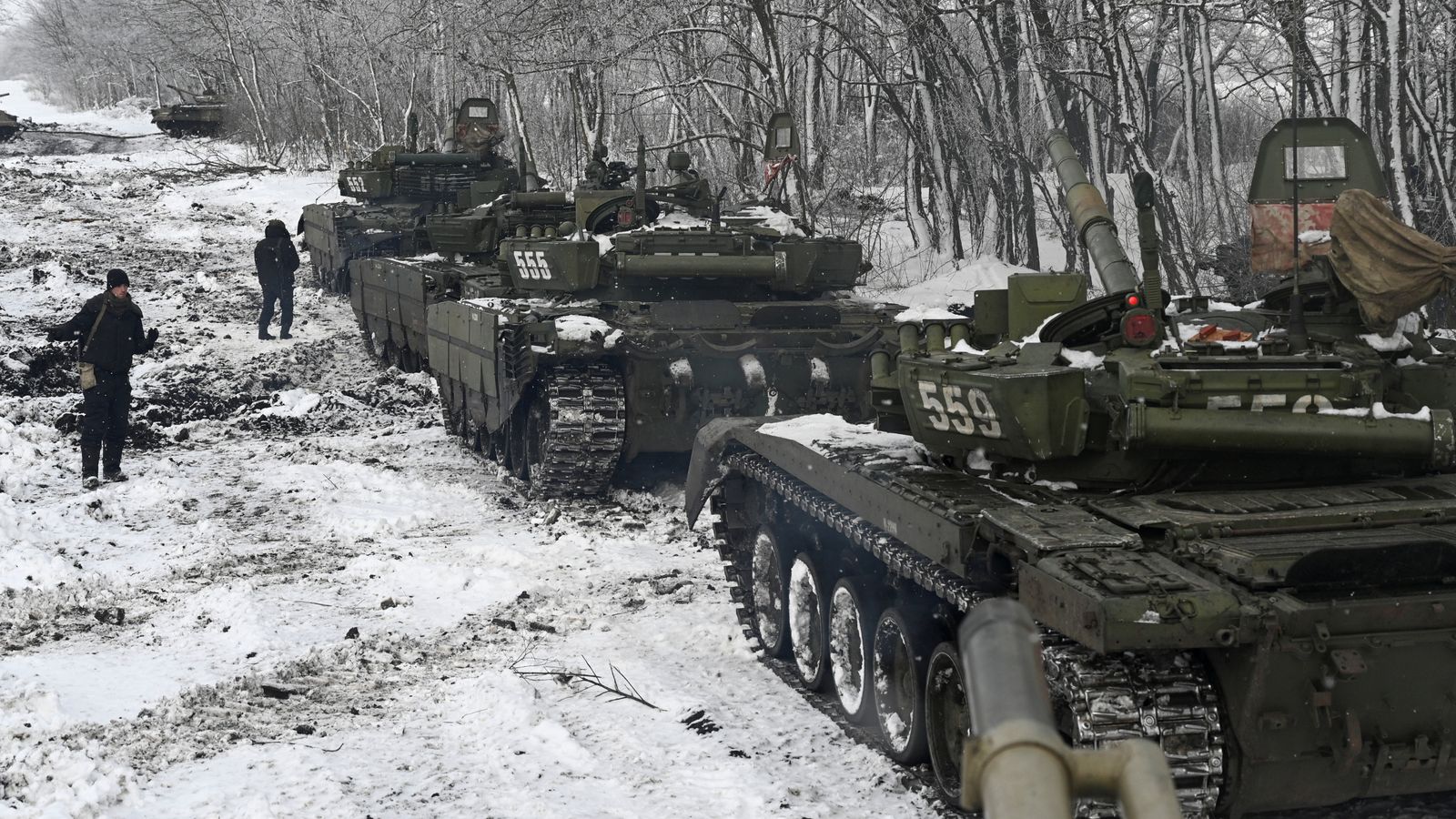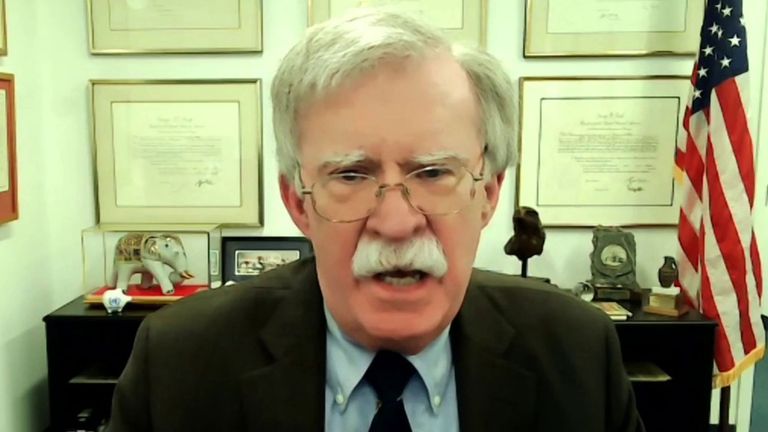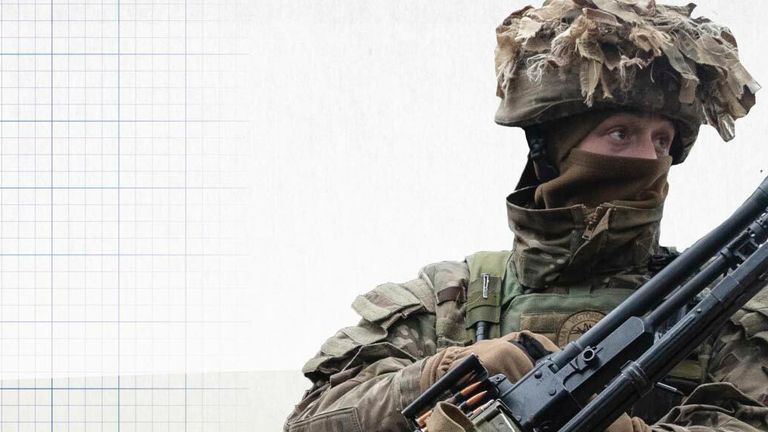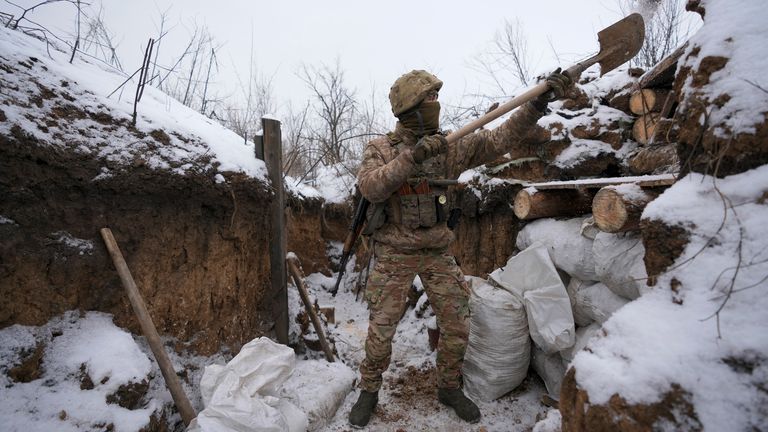Surprise and shock; maximum lethal force; and objectives secured with speed – that is what could be expected if Russia’s military launches a new invasion of Ukraine, according to a well-regarded defence and security expert.
There is still no certainty that Russian President Vladimir Putin will opt for new military action but Britain, the United States and other NATO allies appear increasingly concerned that hostilities are more likely than a negotiated solution to the crisis.
“Right now, he holds all the cards. I think he absolutely will do it,” one western military officer, who has been analysing the situation, said.
Why is Russia worried about NATO – and what does it have to do with Ukraine?
Ukraine’s President Volodymyr Zelensky has accused the West of inciting “panic” with their warnings of an imminent invasion.
Yet the reality on the ground is hard to ignore – unless it really is a highly elaborate bluff.
A mobilisation of Russian troops and weaponry around Ukraine’s borders has continued to expand – now numbering some 130,000 military personnel – despite condemnation by western allies and pressure on the Kremlin to drawdown.
In one of the surest indicators the Russian military is preparing to attack rather than simply conducting training exercises, the Reuters news agency reported that supplies of blood and other medical materials to treat casualties were forming part of the Russian build-up.
President Putin has consistently denied any plans to launch a further invasion of Ukraine – though he had also denied any involvement in Russia’s annexation of Crimea in 2014 until it was a fait accompli.
He has instead, this time, accused NATO of posing a security threat to Russia, while issuing demands to allies to pull all NATO troops out of eastern and central European countries that were once in the then Soviet Union’s sphere of influence.
The Russian leader also wants the alliance to guarantee no further expansion eastwards, such as allowing Ukraine to join the club.
NATO has made clear such requests will be impossible to meet but diplomats have spent weeks trying to come up with a way to bridge the ideological gap between the two sides.
Talks are continuing, with Boris Johnson the latest western leader due to hold a call with President Putin this coming week.
Yet the British defence and security expert – whose opinion is highly regarded on Russia’s way of war but who asked to remain anonymous to be able to share their thoughts more freely – pointed to increasingly threatening rhetoric from the Russian side, the intensification of troop movements and the use of “maskirovka” (military and political deception).
“We may be reaching the point when Putin considers that the Western position will not now change sufficiently to enable him to get what he wants without invasion,” the expert wrote in a note seen by Sky News.
This calculation could of course change were the United States and its allies to suddenly capitulate.
It could be altered – in a different way – by a “rapid deployment of US forces to Eastern Europe and a credible promise to defend Ukraine, coupled with credible threat of draconian sanctions on Russia,” the expert said.
The expert said the West was “somewhere between these two stools”.
US President Joe Biden said on Friday he would be moving US troops to Eastern European NATO countries “in the near term” but there has consistently been no indication from the US, the UK or others that they are ready to put forces into Ukraine other than as military trainers.
“Putin can see that our publicly expressed position is hollow. It is no deterrent to his taking military action because there is no strong political will to act and no adequate military ability to do so in any meaningful way either. To Putin, we are seen to lack the necessary moral fibre,” the expert wrote.
“So, that lack of moral fibre, which till now has encouraged Putin to believe that he could win without a shooting war, will now encourage him to feel that he can win the shooting war if he feels the need to start it.
“At this point, Russian military doctrine comes into play directly. This prescribes: achieving surprise and shock; maximum use of all lethal force available; rapid tempo of operations; and quick achievement of the decisive objectives of the operation.”
Follow the Daily podcast on Apple Podcasts, Google Podcasts, Spotify, Spreaker
The expert said that objectives of any operation may not include the physical occupation of all of Ukraine.
“But they must include the destruction of Ukraine’s capability to offer military resistance, the replacement of its government system, and the prevention of its receiving external help,” the expert added.
Other analysts though believe that President Putin may choose a more limited, less risky option but one that still secures gains and projects strength – such as securing control of eastern parts of Ukraine already held by Russia-backed separatists.
The expert said: “The Russian military operation will, of course, be accompanied by a ramped-up political operation, massive disinformation campaign, economic warfare (such as with gas, wheat), all cloaked in maskirovka.
“It is difficult to imagine what the West could realistically threaten which would be an effective deterrent at this late stage.”




